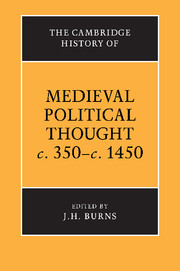Book contents
- Frontmatter
- Introduction
- I Foundations
- II Byzantium
- III Beginnings: c. 350–c. 750
- IV Formation: c. 750–c. 1150
- 8 Introduction: the formation of political thought in the west
- 9 Government, law and society
- 10 Kingship and empire
- 11 Church and papacy
- 12 The twelfth-century renaissance
- V Development: c. 1150–c. 1450
- Conclusion
- Biographies
- Bibliography
- Index of names of persons
- Index of subjects
- References
10 - Kingship and empire
from IV - Formation: c. 750–c. 1150
Published online by Cambridge University Press: 28 March 2008
- Frontmatter
- Introduction
- I Foundations
- II Byzantium
- III Beginnings: c. 350–c. 750
- IV Formation: c. 750–c. 1150
- 8 Introduction: the formation of political thought in the west
- 9 Government, law and society
- 10 Kingship and empire
- 11 Church and papacy
- 12 The twelfth-century renaissance
- V Development: c. 1150–c. 1450
- Conclusion
- Biographies
- Bibliography
- Index of names of persons
- Index of subjects
- References
Summary
For ideas of kingship, the period c. 750 to c. 1150 was no longer one of beginnings but of consolidation. It saw the formation of a single culture in an expanded Latin Christendom. It began with the incorporation of significant Spanish and insular contributions into the mainstream of western political thought, and it ended with new contributions from as far afield as Bohemia and Denmark. The history of the period was dominated first by the Frankish Empire, then by states that succeeded to or were profoundly influenced by it. Its creation strengthened in the short run the traditional elements in barbarian kingship, successful leadership of the people (gens) in wars of conquest and plunder bringing Frankish domination of other gentes. Hence the hegemonial idea of empire, of the emperor ruling many peoples and realms, arose directly from the political experience of the eighth-century West. In the longer run power devolved to kingdoms that proved durable, without a gentile identity or an economic base in plunder and tribute. This brought new formulations of the realm as a territorial and sociological entity, the aristocracy sharing power and responsibility with the king. The idea of empire detached from its gentile anchorage acquired Roman-Christian universality.
In the eighth century the Frankish kings Pippin and Charlemagne successfully mobilised two elites, the higher clergy of the Frankish Church and the Frankish aristocracy. Power-sharing was built into the fabric of the Carolingian Empire though it was masked at first by a community of interest that evoked a chorus of praise for rulers evidently possessed of divine approval.
- Type
- Chapter
- Information
- The Cambridge History of Medieval Political Thought c.350–c.1450 , pp. 211 - 251Publisher: Cambridge University PressPrint publication year: 1988
References
- 76
- Cited by

